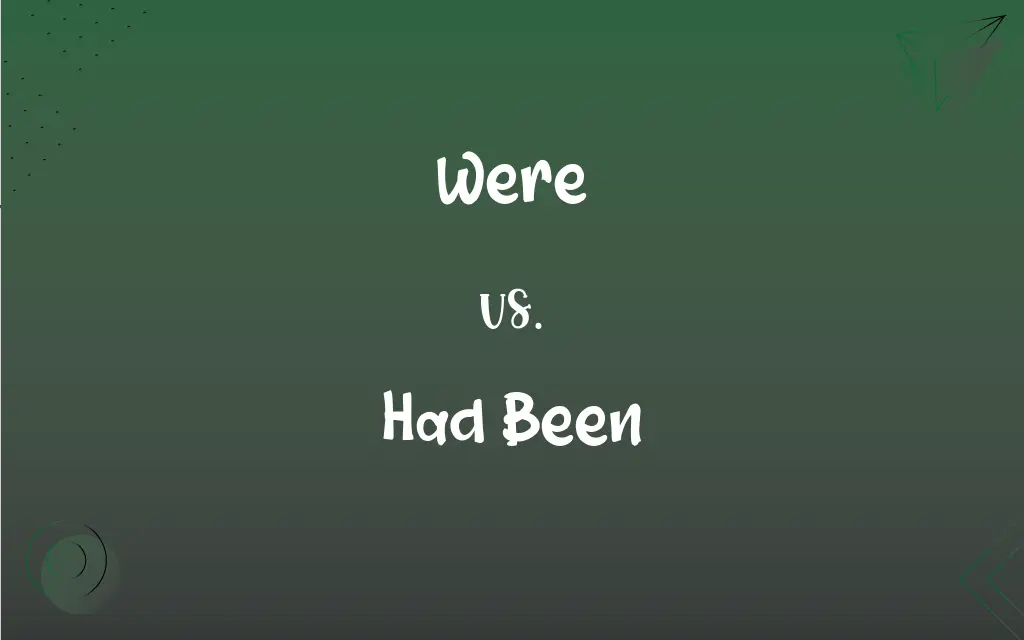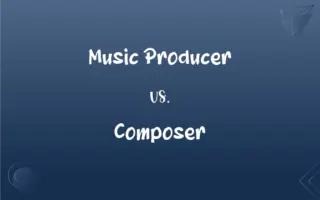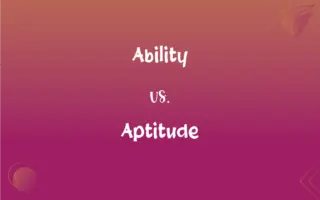Were vs. Had Been: What's the Difference?
Edited by Aimie Carlson || By Harlon Moss || Published on December 15, 2023
"Were" is the past tense of "are," used for plural subjects or "you"; "had been" is the past perfect tense, indicating an action completed before another past action.

Key Differences
"Were" is the past tense form of "are," used with plural subjects and the pronoun "you." It describes a state or action in the past. On the other hand, "had been" is the past perfect form of "be," used to denote an action that was completed before another action in the past. It emphasizes the completion of an action before another time point.
In usage, "were" often sets the scene or describes conditions in the past, such as in "They were happy." "Had been," however, adds a layer of complexity, suggesting a completed action or state that has an impact on another past event, as in "They had been happy before the incident."
Grammatically, "were" can also be used in subjunctive mood to express unreal or hypothetical situations, e.g., "If I were a bird..." In contrast, "had been" cannot be used in the subjunctive mood. It's strictly indicative, denoting actual events or states in the past.
"Were" is simpler and more direct in expressing past actions or states. For instance, "They were at the park yesterday." "Had been" is more complex, implying a duration or continuation of a state up to a point in the past, as in "They had been at the park since morning."
"Were" is straightforward in its past tense usage, while "had been" provides a nuanced temporal perspective, linking two past events or indicating the duration of a past state up to another point in the past.
ADVERTISEMENT
Comparison Chart
Tense
Simple Past
Past Perfect
Usage
Describes a past state or action
Indicates an action completed before another past action
Subject Agreement
Plural and "you"
Any subject
Temporal Focus
Specific point in past
Duration leading up to a point in past
Subjunctive Mood
Can be used (e.g., hypothetical situations)
Not used in subjunctive mood
ADVERTISEMENT
Were and Had Been Definitions
Were
Past tense of "are" for plural subjects.
They were excited about the trip.
Had Been
Used to express a past condition over a period.
It had been raining all night.
Were
Used in subjunctive mood for unreal situations.
If I were a millionaire, I would travel the world.
Had Been
Indicates a past state or action affecting another past event.
He had been the best in his class.
Were
Expresses past actions or states in direct form.
We were friends in college.
Had Been
Shows a past action's duration before another event.
They had been waiting for hours when help arrived.
Were
Used with "you" to address singular or plural.
You were the star of the show.
Had Been
Past perfect tense of "be" indicating completed action.
She had been a teacher before retiring.
Were
Indicates a past condition or situation.
The streets were empty last night.
Had Been
Used for any subject to describe a completed state.
The book had been on the shelf for years.
Were
Second person singular and plural and first and third person plural past indicative of be.
Were
Past subjunctive of be. See Usage Notes at if, wish.
FAQs
Can 'were' indicate a continuous action in the past?
No, 'were' is a simple past tense form.
How is 'were' used in questions?
'Were' is used at the start of a question, as in "Were you there?"
What is the basic form of 'were'?
'Were' is the past tense of 'are'.
How does 'had been' express duration?
'Had been' shows how long something was happening before another past event.
Is 'were' used in hypothetical statements?
Yes, 'were' is used in the subjunctive mood for hypotheticals.
Can 'had been' be used for singular subjects?
Yes, 'had been' is used for all subjects.
Is 'had been' used in the subjunctive mood?
No, 'had been' is not used in the subjunctive mood.
Can 'were' be used for singular subjects?
No, 'were' is used for plural subjects and 'you'.
Does 'were' always imply a past action?
Yes, 'were' always refers to a past state or action.
Is 'had been' used for specific time references?
Yes, it can be used to refer to a specific duration in the past.
What does 'had been' indicate?
'Had been' indicates a past action completed before another past action.
Can 'had been' indicate a past habit?
No, 'had been' indicates a completed action or state, not a habit.
Can 'were' suggest a conditional mood?
Yes, especially in unreal or hypothetical conditions.
Can 'had been' suggest an ongoing state in the past?
Yes, it can indicate a state that was ongoing until a certain point.
Is 'were' appropriate for formal writing?
Yes, 'were' is suitable for all types of writing.
Does 'had been' imply causality?
It can imply a cause-effect relationship between two past events.
Can 'were' be used for a single person?
Yes, when addressing someone directly as "you."
How is 'were' used in negative sentences?
By adding 'not', as in "They were not ready."
Can 'had been' be used in passive constructions?
Yes, it is often used in passive voice.
Is 'had been' used in future tense contexts?
No, 'had been' is exclusively used for past contexts.
About Author
Written by
Harlon MossHarlon is a seasoned quality moderator and accomplished content writer for Difference Wiki. An alumnus of the prestigious University of California, he earned his degree in Computer Science. Leveraging his academic background, Harlon brings a meticulous and informed perspective to his work, ensuring content accuracy and excellence.
Edited by
Aimie CarlsonAimie Carlson, holding a master's degree in English literature, is a fervent English language enthusiast. She lends her writing talents to Difference Wiki, a prominent website that specializes in comparisons, offering readers insightful analyses that both captivate and inform.







































































